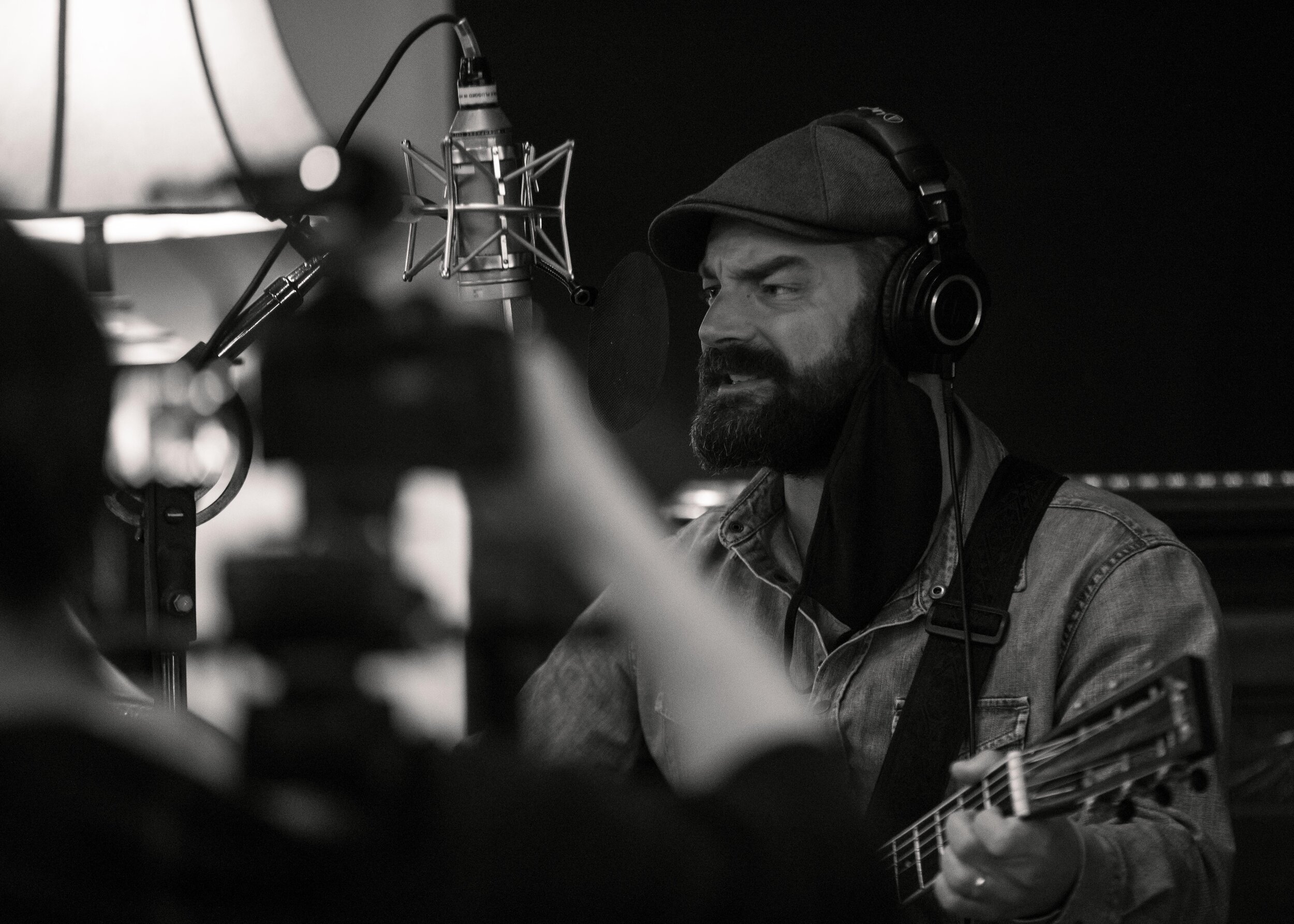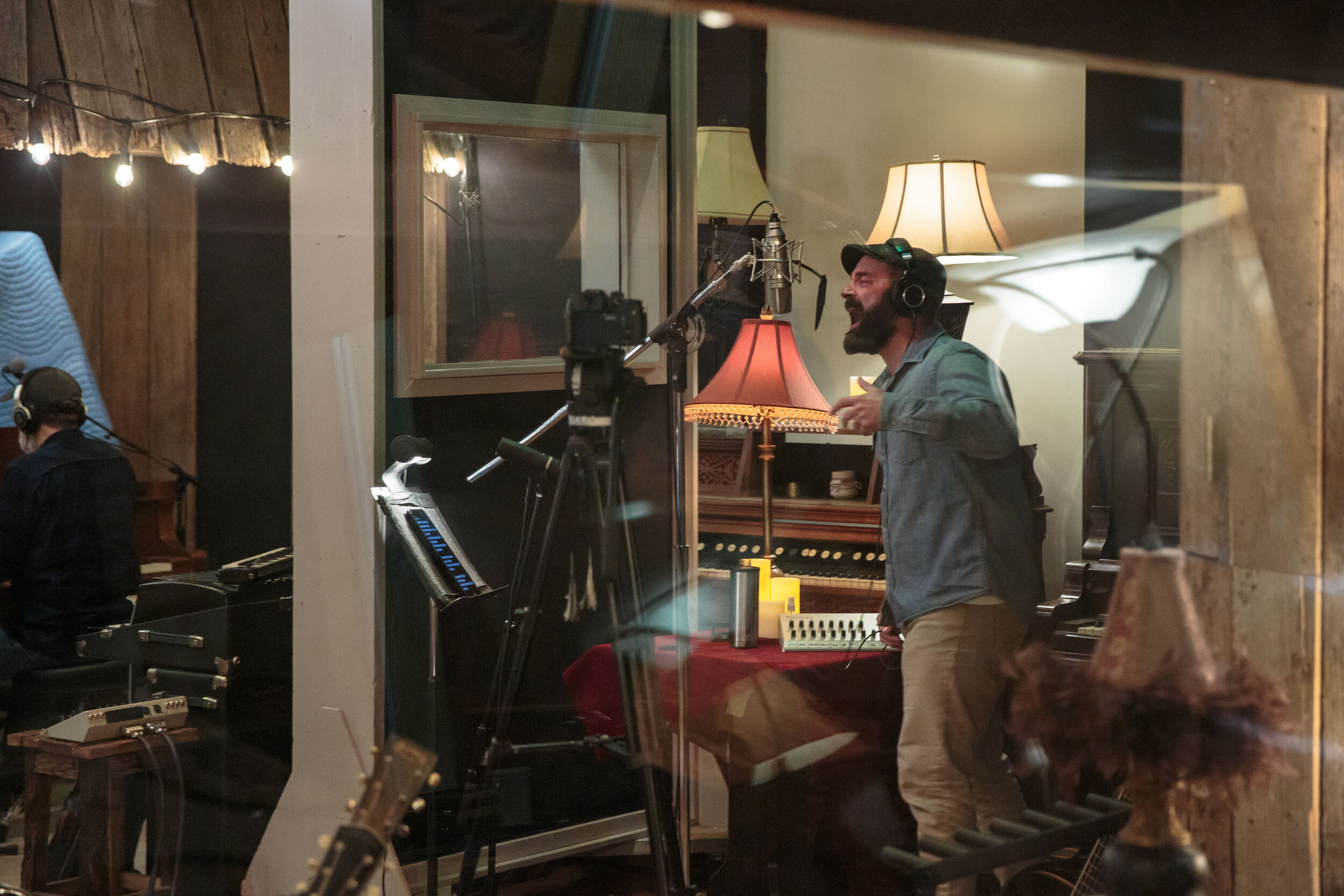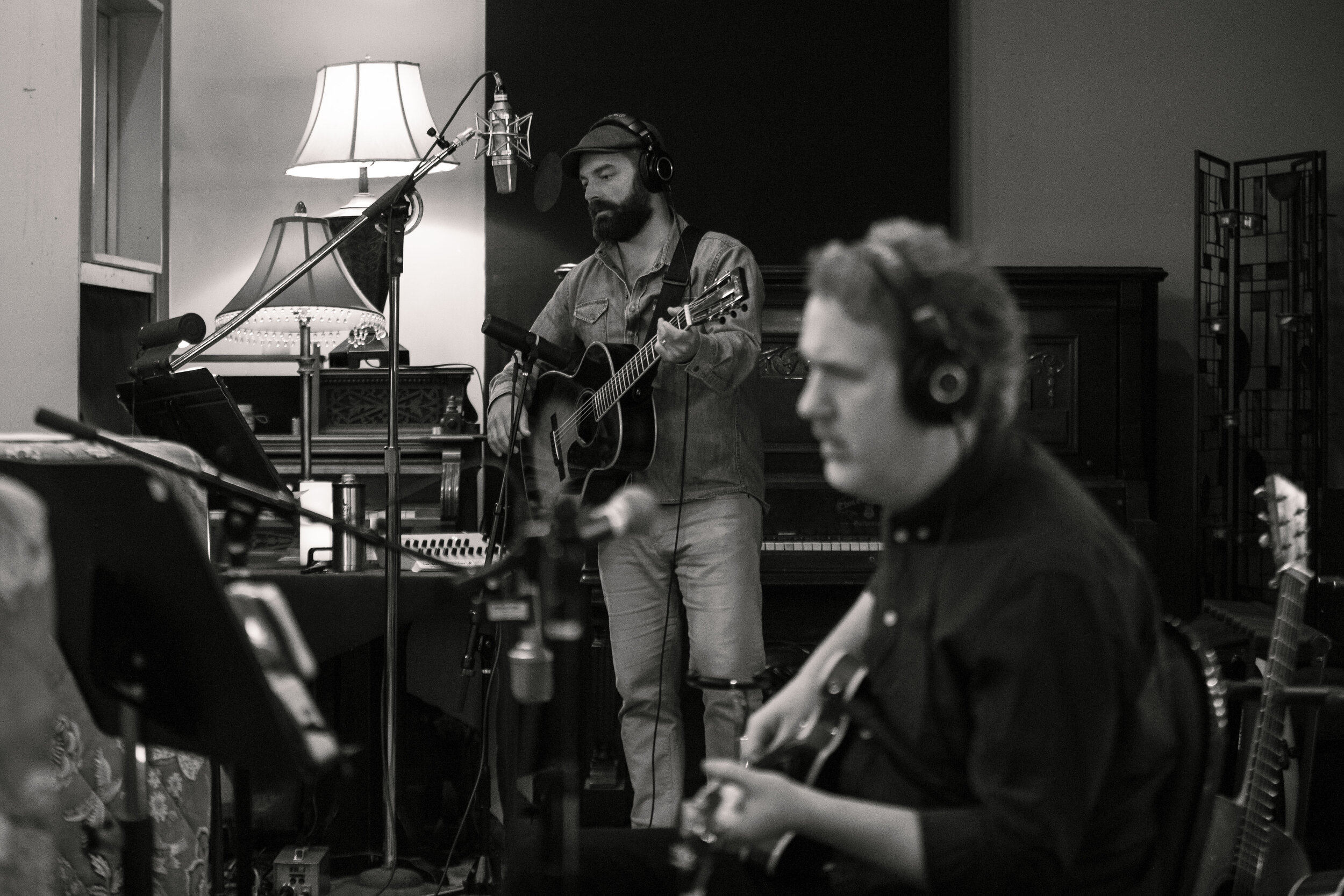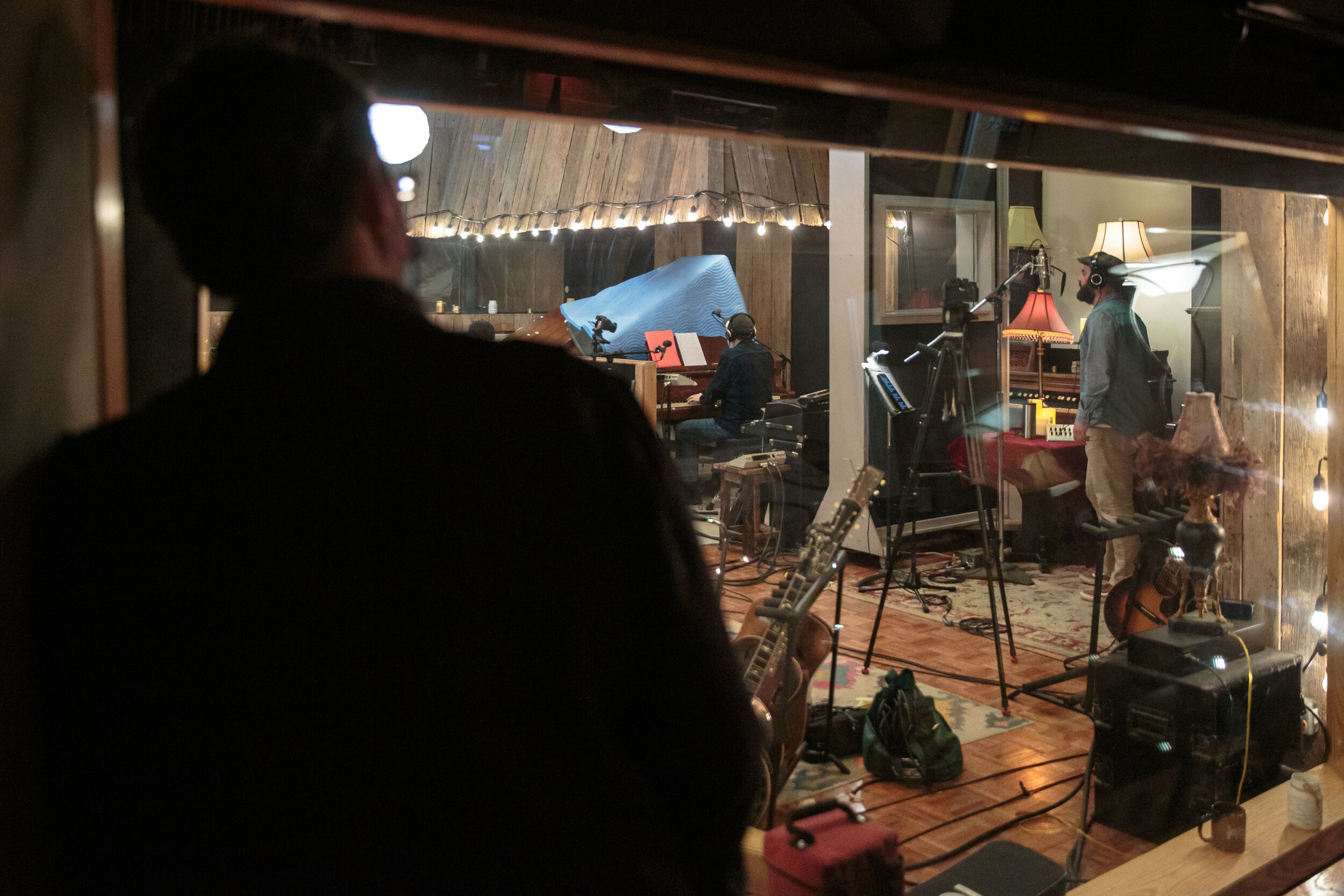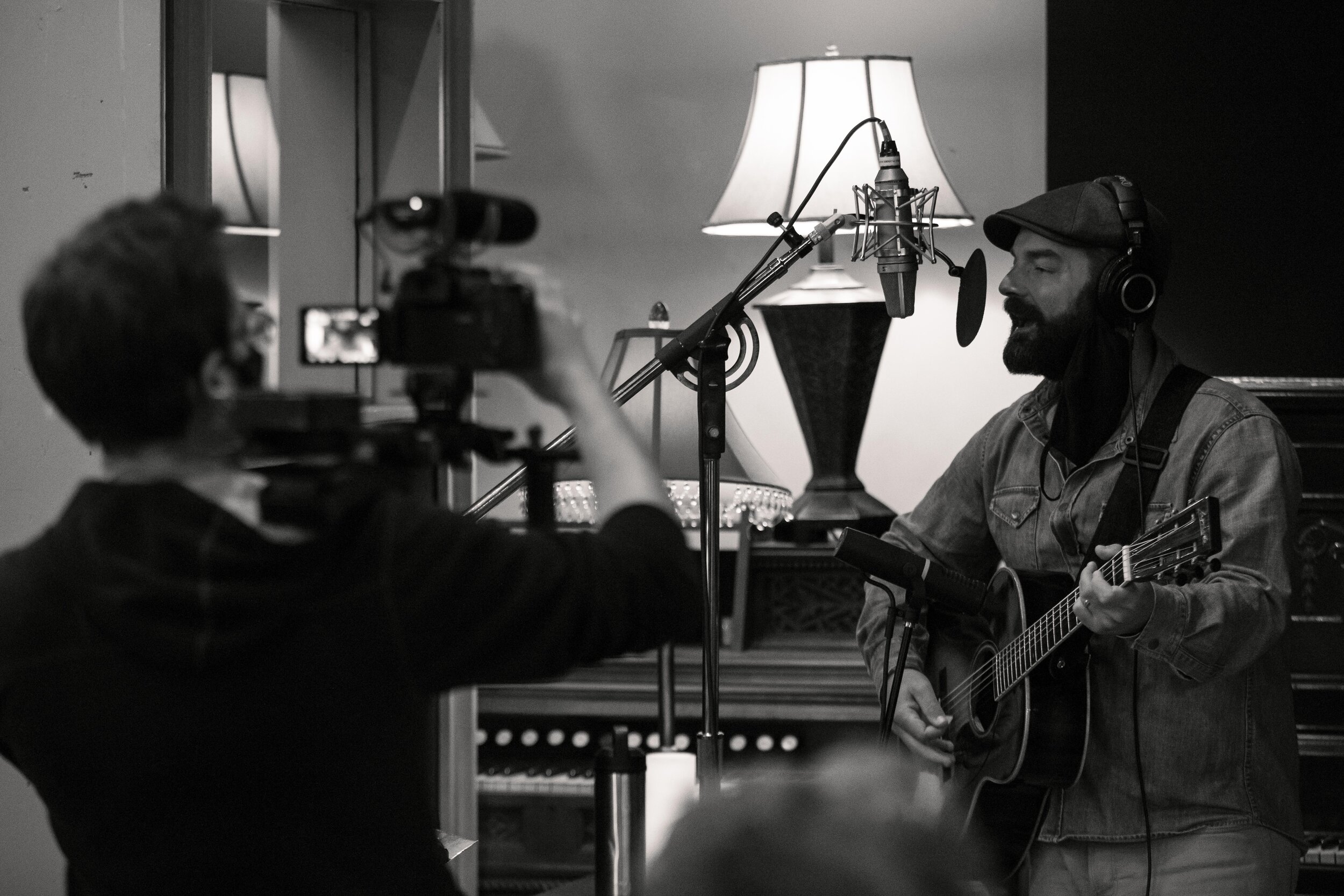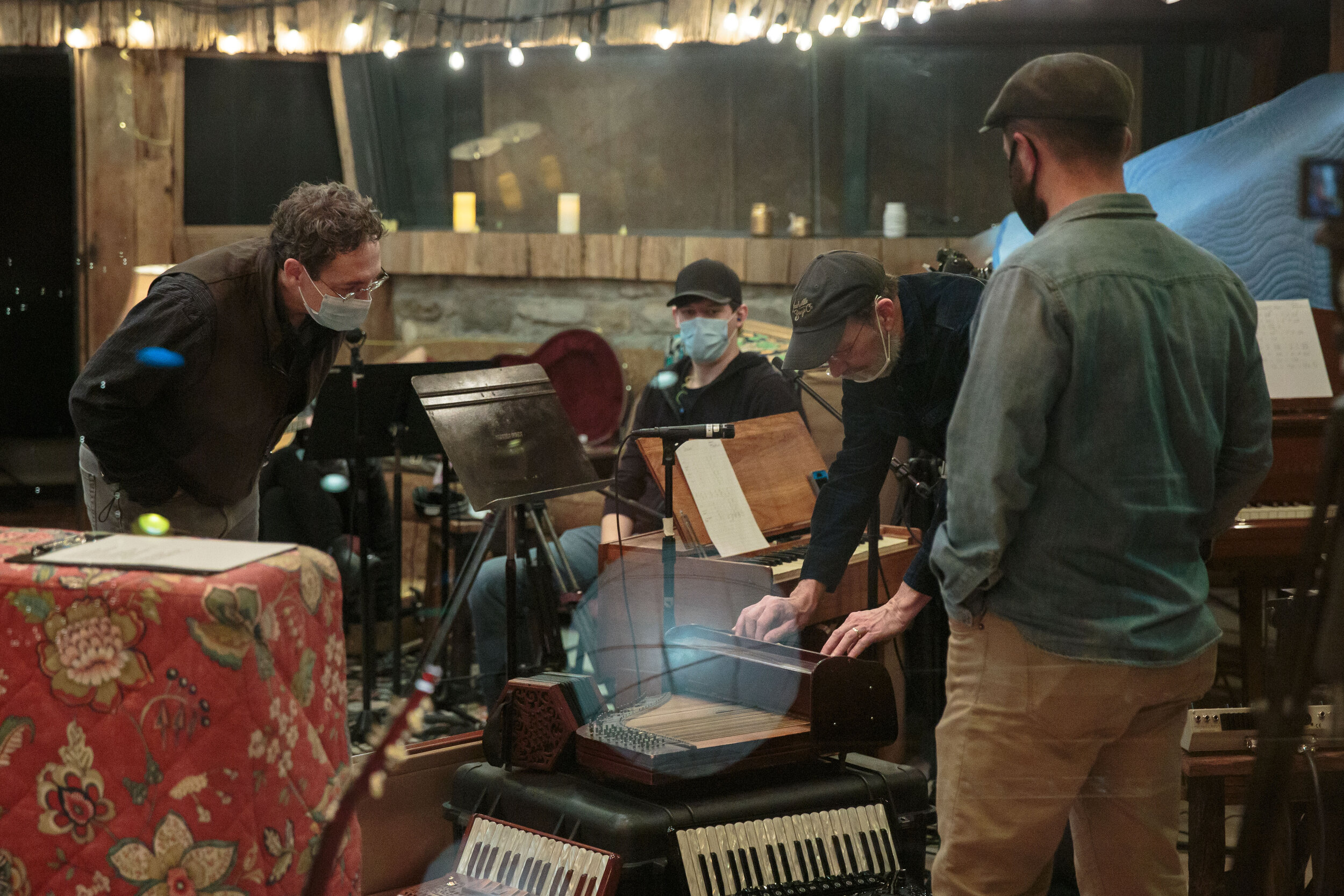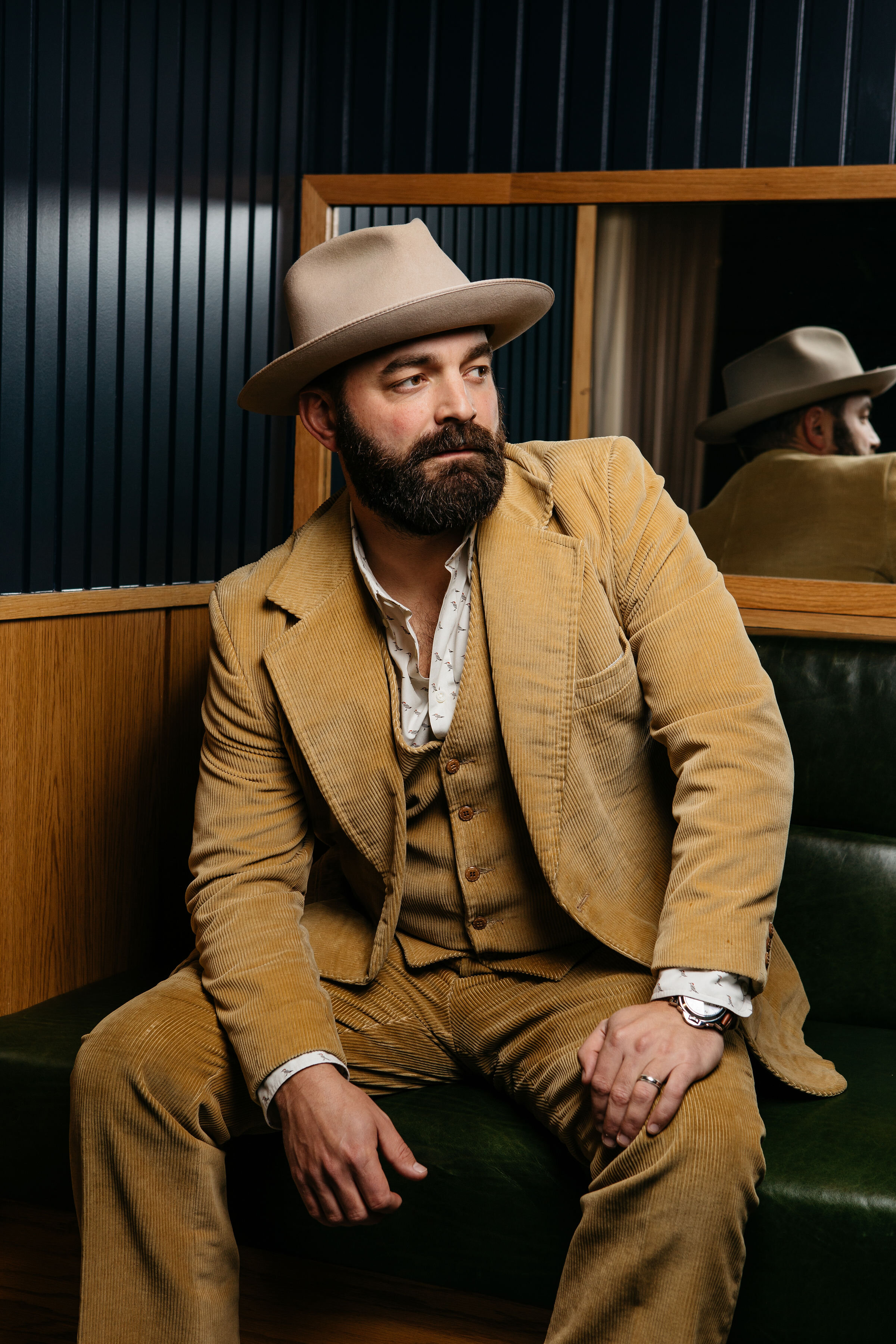TOKENS PODCAST: S3E7
Drew Holcomb, whom the Rolling Stone recently called “one of Americana’s Most Popular Stars,” talks with Lee about his surprising road through academia to becoming a singer-songwriter; the tragic loss of his younger brother; and what it’s like to have courage and hope as a songwriter, artist, husband, and father in the midst of the current polarized cultural moment. PLUS! Live in-the-studio-performances of two of his most moving songs: “You Never Leave My Heart” and “Dragons.”
PHOTOS FROM THE RECORDING
ABOUT THE GUEST
Drew Holcomb & The Neighbors has always charged listeners’ hearts and minds while inspiring them to think, feel, dance, and love, never more so than on his 2019 album Dragons.His most collaborative to date, the record is his first with featured artists & songwriters including Lori McKenna, Natalie Hemby, Sean McConnell, The Lone Bellow, and Ellie Holcomb. Dragons debuted at #1 Billboard Americana/Folk Albums, #1 Amazon New Albums, and #1 iTunes Singer Songwriter Chart and led to a career spanning feature in which Rolling Stone declared Holcomb as “One of Americana’s Most Popular Stars.” With several critically acclaimed albums under his belt, Holcomb has been featured by NPR, Entertainment Weekly, Billboard, CMT and more. An Emmy Award-winner with music synced in over 75 of TV’s most watched shows, Holcomb has also appeared on Jimmy Kimmel Live! twice. Among Holcomb’s ambitious projects are his Moon River Music Festival, an annual festival in Chattanooga, Magnolia Record Club, a monthly vinyl subscription service, and The Headliner, a Golf and Music Weekend, which sold-out its inaugural year in 2019. Holcomb has traveled the globe with a catalog of vibrant, honest songs that explore the full range of American roots music. The band has appeared at Bonnaroo, Hardly Strictly Bluegrass, Stagecoach and more, while sharing stages with legendary artists like Willie Nelson, John Hiatt, Zac Brown Band, The Avett Brothers and more.
ABOUT TOKENS SHOW & LEE C. CAMP
Tokens began in 2008. Our philosophical and theological variety shows and events hosted throughout the Nashville area imagine a world governed by hospitality, graciousness and joy; life marked by beauty, wonder and truthfulness; and social conditions ordered by justice, mercy and peace-making. We exhibit tokens of such a world in music-making, song-singing, and conversations about things that matter. We have fun, and we make fun: of religion, politics, and marketing. And ourselves. You might think of us as something like musicians without borders; or as poets, philosophers, theologians and humorists transgressing borders.
Lee is an Alabamian by birth, a Tennessean by choice, and has sojourned joyfully in Indiana, Texas, and Nairobi. He likes to think of himself as a radical conservative, or an orthodox liberal; loves teaching college and seminary students at Lipscomb University; delights in flying sailplanes; finds dark chocolate covered almonds with turbinado sea salt to be one of the finest confections of the human species; and gives great thanks for his lovely wife Laura, his three sons, and an abundance of family and friends, here in Music City and beyond. Besides teaching full-time, he hosts Nashville’s Tokens Show, and has authored three books. Lee has an Undergrad Degree in computer science (Lipscomb University, 1989); M.A. in theology and M.Div. (Abilene Christian University, 1993); M.A. and Ph.D. both in Christian Ethics (University of Notre Dame, 1999).
JOIN TOKENS ON SOCIALS:
YOUTUBE
FACEBOOK
INSTAGRAM
JOIN LEE C. CAMP ON SOCIALS:
FACEBOOK
INSTAGRAM
LEE C. CAMP WEBSITE
TRANSCRIPT
Lee Camp: This is Tokens. I'm Lee C. Camp.
Drew Holcomb: Everybody has walked through hell and loss and tragedy. And it's a miracle that we're all able to function in light of all of that.
Lee Camp: That's Drew Holcomb, Nashville-based Americana singer-songwriter, and frontman of the band Drew Holcomb and the Neighbors.
Drew Holcomb: Sometimes artists have to take a chance and to be vulnerable.
Lee Camp: On today's episode, Drew does a bit of that chance-taking, talking about how his music has in some instances been a response to some of his frustrations with American evangelicalism; and he shares some of his own vulnerabilities, and some of the stories behind two of his most beautiful songs: "Dragons," an anthem-like call to courage; and "You Never Leave My Heart," a ballad on the joyful life, and tragic loss, of Drew's brother.
Drew Holcomb: All of my music has sort of been framed a little bit by his life and his death.
Lee Camp: Plus, live performances from Drew of both of those songs from our sessions at Nashville's famed Sound Emporium.
All this coming right up.
Part 1
Lee Camp: Grateful to have Drew Holcomb with us, a singer songwriter, musician front man for the band to Drew Holcomb, a Memphian by birth. In Nashville how long now?
Drew Holcomb: Oh 15 years.
Lee Camp: 15? Yes.
Drew Holcomb: And basically the adopted son now.
Lee Camp: Yes, that's right. Yeah. But you and I both have kind of slipped in under the, we're not the new crowd in Nashville anymore.
Drew Holcomb: That's right. Yeah.
Lee Camp: We've been around long enough to be kind of Nashvillian. Yeah. But welcome. Glad to have you back.
Drew Holcomb: Thanks for having me, great to be on.
Lee Camp: Rolling Stone recently dubbed you something like an Americana hero.
Drew Holcomb: That was a fun one. Yeah. It's fun to be validated by something you've read since you were a kid.
Lee Camp: Yeah, I would imagine so. That's got to feel kind of sweet, I would imagine after all the hard work that goes into doing the kind of work you do.
Drew Holcomb: Yeah. It is. You try not to, especially as you get older, let those sort of benchmarks and milestones be too much of a identity sort of possession.
But it is still nice and you're grateful for it when that kind of thing happens. That article kind of, you know, done a lot of interviews over the years, a lot of articles with different publications. That one kind of made the rounds, which was a, it's always surprising to me when people find me through that sort of thing. But that's definitely happened with that piece.
Lee Camp: Yeah. Do you, or how do you deal with, I mean, I'm speculating, so correct me guys. I don't want to put any kind of words in your mouth and not presume that I know anything of what your experience is like. But I would assume from what I know about the life of singer songwriters and creative types in Nashville, that it can often be a long hard slog and take a long time to get as many people knowing about what you're doing as you want.
So there's that sort of naturally humbling part of the process, I would suppose on the one hand. And then once you get to a place of where you are in your career, lots of people are knowing what you're doing and then there's the temptation of vanity on that side. So what's that experience like for you between the frustration and potential sense of humiliation?
Drew Holcomb: Yeah, well, I came to where we, you know, we came to where we are now through years of hard work but also lots of moments of sort of blind luck. Or, you know, blind, providence, whatever, you know, things are outside of our control. However you want to frame that, but you know, I've always been a dreamer, but always so had quite a bit of a pragmatic spirit.
And so from the get go, my main marker of whether or not to keep going was, am I paying my bills? And is there a little bit left over to keep dreaming with, you know? And was fortunate to have the right people at the right time kind of come alongside me in various ways and various seasons of this, you know, 16 year journey.
But also had the benefit of being surrounded by people who I've known for a long time, professionally. Like my guitar player, Nathan, he and I came up together, you know? A lot of the people that I'm still surrounded with, sort of lived through those barren try-hard every day, mostly fail years.
You can't really get away with too much when you're surrounded by people who've been through the same thing you have. And then we were given some great advice. There's a counselor, named Al Andrews, that a lot of Nashville artists know and have been to. And I said, oh, you've been counseling musicians and artists for 20 years, do you have like one big takeaway? And he said, oh yeah, that's easy. Human heart was not built for notoriety.
Lee Camp: Those are for potentially voting words.
Drew Holcomb: Yeah they were. They also sort of gave me like a nice solid anchor.
You know, cause it is really easy to sort of live and die by the highs and lows of like, man, we sold out the whatever venue and it was an amazing night. And everybody's screaming and they loved the songs. You know, it's like definitely a high. And then the lows of like, no one cares about this record and people forgot about the last tour. This one's not going as well.
It's easy to sort of live in those like high peaks, low valleys. And we've tried to sort of like come off of a great show, but I mean, that was great and grateful for that, but that doesn't identify me. That's not like who I am. And then the same thing when you go like to the big disappointment and not sort of stay down in that valley.
Yeah. But it's still acknowledged that like one's really great and the other's really hard.
Lee Camp: Somewhere recently, I'd read, and I don't know where this comes from, but a kind of spiritual practice of regularly saying to yourself, that has passed or that has concluded.
Drew Holcomb: That's great.
Lee Camp: And you’re just regularly being aware of every moment passes. You know it passes and it's done. And another one that's related to that, that I've liked a lot is I read about this monk who used to have this favorite coffee mug. Every time he would drink out of it, he would say it’s already broken.
And so there's part of that that you could read is kind of pessimism. But on the other hand, it's like a sort of acceptance of this is the way life is. And good things come and you can enjoy them and then they go.
Drew Holcomb: Yeah, I love that.
Lee Camp: So one of the things, I don't know how many of your listeners know this is about you. But one of the things that I've always found fascinating about you is that you have a master's in theology from St Andrew's University. And also in your undergrad, you did a lot of history and religious studies. How do you see those disciplines factoring into your work? Particularly when you're not a contemporary Christian artist, you're an Americana artist.
Drew Holcomb: Yeah. Well, I sort of see all of popular music as sort of spiritual reckoning. You know, when thinking about artists like Ray Charles, you know, who grew up singing in the church. Or Springsteen who grew up in like a strict Catholic background. Or, you know, all the religious imagery and Dylan's music. You know, you can't really separate popular music from sacred music in the sense of their sort of historical connection to each other. And so, the history connection for me was always just like, I loved narrative. I love connecting cause and effect and how things came to be. So I've always been a little bit of a sort of backward thinker, or past driven thinker, wanting to understand the present moment through the lens of the past.
I think it's a really like helpful tool for understanding life. And I always found that you can't separate Western history from religious history, you know? Theology drives practice, you know, throughout, especially sort of Western, European, and American history.
And so, I always saw those two things sort of, as one interchangeable practice was sort of studying those two things. But I went to seminary mainly because that was my original plan was to become, sort of, uh religious studies teacher, history teacher.
If you'd asked me through college, what are you going to be doing in your twenties and thirties I’d say I'm working on a PhD somewhere writing and hopefully landing an academic job. And music was sort of a side hustle. Music had been like a really important part of my own personal life and personal journey through some difficult things that I'd walked through in my later teenage years.
And so music was sort of the practice of my theological sort of conundrums that I found myself in. And trying to find God. And so I found that same thing happening in music. Starting from the stuff I liked, that was the oldest stuff, which was like, my parents loved, you know, sixties radio, and then all the way up to listening to YouTube and David Gray and Radiohead in high school.
So I felt like those things were all sort of running on parallel tracks in my life.
Lee Camp: Yeah. So being married to Ellie Bannister, who is committed to contemporary Christian genre and you in the Americana genre, what kind of conversations do you all have with each other about what you're doing?
Drew Holcomb: Yeah. Well, Ellie sort of ran from the idea of doing music from a very early age. She grew up around it. She Felt like it was not where she wanted to be career-wise. And so she always swore she'd never marry a musician. She did, obviously. So…
Lee Camp: No, she married someone who was going to seminary.
Drew Holcomb: That's right. That's right. That's right. That’s probably what she thought. I mean, I was already doing music, but she thought, I think at the time we thought it was just a diversion for a couple of years. So she was a school teacher. I convinced her after we got married to join my band. And she started writing songs three or four years in.
She was supposed to be writing songs for our band. At the time we were kind of a bar band. I mean, that's where we played was like, you know, bars like cover charge, kind of, I mean, it was original music, but it was like, you know, smokey bars. So it was nothing like what she sort of grew up around with contemporary Christian music, but the songs she was writing we're very sort of confessional in a way that sort of lent itself towards the CCM world in her own sort of folky way.
And we kind of came to this head where it's like, you're writing these great songs. Like you needed to do your own thing, you know? And so that's kinda what happened. And you know, she was like the first, I think she was the first independent artist to win a dove new artist of the year.
So she still never really, like, got into the commercial hub of CCM music. And it's kind of existed around it on the edges of it in the way that she really enjoys sort of being in charge of her own schedule and her own life. And that's worked well for me. So when we talk about music we both create very differently not even necessarily in terms of content. But just like, Ellie's a sort of melody first writer, I'm a lyric first writer. You know, we've gotten to the point now, we only write songs together if we know who's in charge of the writing session. So it's like, what are we writing for?
And it's like, okay, writing for Ellie's record. Okay. Ellie's in charge and I'm just here to help. And then vice versa. Otherwise we sort of just have good solid marriage fights about songwriting. There's just a lot of mutual respect for each other, each other's creativity, and also sort of staying out of each other's lane.
Yeah. That's been a helpful thing for us.
Lee Camp: So when you think about bringing to bear theological insight into songwriting you've certainly had elements in your music where it seems like sometimes you're shooting a shot over the bow of American evangelicalism. I mean, for example, from “Ring The Bells”: “Ring the bells this time, I mean it. Bid the hatred fare thee well. Give back the pieces of my Jesus. Take your counterfeit to hell.”
I mean, that's a clearly…
Drew Holcomb: That really wasn’t so much a shot across the bow as much as I was aiming directly for the hole.
Lee Camp: So talk to me about the anger or the frustration or the process by which you finally give vent to a lyric like that.
Drew Holcomb: Yeah. I was in Los Angeles with my friends, Abner and Amanda Ramirez from JOHNNYSWIM.
Lee Camp: I'm proud to say that the first time they ever played the Ryman was on the Tokens Show.
Drew Holcomb: Was it really? Oh, that's awesome. Yeah. They're wonderful.
Lee Camp: Yeah, they're great folks.
Drew Holcomb: And they've made a lot of return visits to the Ryman since then, I guess.
So. We were good friends and we decided to write together and it just happened to be scheduled that when I went was two days after the Charlottesville, white supremacy, gatherings, and tragedy there. So we were just angry about some public statements by some pretty powerful evangelicals sort of trying to downplay the events of that moment and also trying to sort of equivocate.
You know what happened there, the whole, both sides sort of mentality. Yeah I felt like, and still feel like, the church that I grew up in and love has given itself away to some idols in the last, maybe always, you know. But I've seen it sort of the last decade as being sort of a watershed moment where people of my generation and younger find it harder and harder to continue to sort of stay in the family of evangelicalism. Which in some ways I think is okay. Like Ellie and I, you know, we go to an Anglican Church. And we find the sort of, this is our way not, this is the way as a helpful sort of way of being a believer in this sort of red God, blue God, churches that exist, you know, lowercase C.
Lee Camp: Right, yeah. When you continue to look at that sort of tumult in the sociopolitical context, in which we find ourselves, what are things that you're especially paying attention to that continue to frustrate you and, or what are things you see that give you some sort of hope?
Drew Holcomb: Yeah, that's a great question. I'll start with the things that frustrated me. I think that the conservative evangelical base has led in like the primary motivating factor for public engagement is fear. Fear of a place at the table being lost, fear of ways of life being, you know, threatened. And so therefore things like truth takes a back seat to sort of maintenance and survival of power.
On the other hand, I see like it's a better time for my daughter ever to be alive than ever before. You know, as far as the opportunities that are available to her. I see that as a really positive thing. I see people like Beth Moore stepping out into these incredible leadership vacuums and speaking truth to the world. People that I would not have expected to sort of fulfill that role. Thinking of her as a kid, just like, as this woman who wrote these Bible studies that, you know, my mom and her friends loved.
So I think that the idol of sort of America being like the great last hope of the world has sort of been done away with. Not that America is not a great, you know, actor in some ways. But it's obviously more complicated, and not everybody agrees with that.
And I think that's okay. I think there's more opportunity for people who want to be honest about the complexity of the world, and the complexity of our sort of interrelated gilts and opportunities. It's never been a better time to sort of lean into those sorts of things and tear down and then rebuild a better version.
You know, I think there's a lot of opportunity there. I find it a really fascinating time to be a parent, also a difficult time to be a parent. It's a really busy time. Social media, globalization, race relations, political upheaval. You know, a lot of things to pay attention to all at once. And we're going to trip and fall and fail, but bear witness to it, no matter what, you know?
Lee Camp: You're listening to Tokens: public theology, human flourishing, and the good life. We’re most grateful to have you joining us.
If you've not yet done so, please subscribe today to the Tokens podcast wherever you get your podcasts; and let us know where you're listening from and some of the things you'd like to hear more about. Email us at podcast@tokensshow.com. Also remember you can sign up for our email list, or find out how to join us for a live event, all at tokensshow.com.
This is our interview with Americana singer-songwriter Drew Holcomb. Coming up, we hear about the stories of loss, hope, and courage which inspired two beautiful, moving songs from his latest record, as well as live performances from Drew of both said songs. These were performed alongside our incredible all-star ensemble of Nashville players during our recent sessions at Nashville's Sound Emporium. Part two in just a moment.
Part 2
Lee Camp: Welcome back to Tokens and our interview with Americana singer-songwriter Drew Holcomb. During this segment, Drew and I discussed two of the most moving songs from his most recent album. The first is the title track "Dragons," an anthemic call to bravery and magnanimity, full of grit and passion and living life large. This is Drew's performance for us in the studio that day alongside a world class ensemble: Scott Mulvahill, Sierra Hull, Bryan Sutton, Aubrey Haynie, Chris Brown, and Jeff Taylor. And of course I weasled myself into singing some vocals on the refrain.
"Dragons”
I have found myself repeatedly playing your “Dragons” song. And this chorus: “Take a few chances. A few worthy romances. Go swimming in the ocean on New Year's day. Don’t listen to the critics. Stand up and bear witness. Go slay all the dragons that stand in your way.”
What about your life leads you to such a lyric?
Drew Holcomb: You know, I'm I've always been a little bit of a contrarian. And so framing some of those things about slaying dragons, bearing witness, swimming, the ocean, New Year's day, obviously something that's like a discomfort.
Yeah. But proving to yourself that you have some sort of power over death, you know? It's like, these are all like ways to try to beat death a little bit, you know? So this song originally sort of started out as this, I had the lyric about go slay all the dragons and stand in your way. There was a friend of mine who was in a different band. He called doing shows like, you know, being on stage, called it slaying dragons. You know, don't forget you're slaying dragons up there. Both for yourself and then hopefully for the audience. Yeah. Beating fear, you know, all those sort of things. So that's where the song sort of started. Then I wrote it with my friend, Zach Williams from The Lone Bellow, and we both had these larger than life grandfather figures.
And so the conversation was about that and sort of built the song as this sort of dreamscape of encountering the ghost of your grandfather while you're on a camping trip. And it was just a nice, like medium for some of these sort of like, you know, rally cry lyrics that in the wrong context could be maybe even a little cheesy. You know, but in the right context, coming from the ghost of your grandfather, it's pretty like, yeah, man. I need to dust myself up off the floor and get back on the horse.
Lee Camp: Go out and get it. Yeah, yeah. I think one of the reasons that I resonate so much with that, and people listening to the podcasts would have heard me say this too many times already but years ago, teaching ethics classes, you know, I started realizing if my students don't have the courage, it doesn't matter if they know the right thing to do.
Drew Holcomb: That's great, yeah.
Lee Camp: And then to realize that, you know, in the great ancient virtue traditions, courage was one of the four cardinal virtues. You know, if you don't have this one, then you can't really make much progress with any of the rest of them. Yeah. And so I love that this picture of in my sense, you know, courage is central to all of this stuff that you're singing about.
Drew Holcomb: Yeah. And there's also like a bit of legacy sort of. Like if you speak it about yourself, maybe it'll, you'll like step into it. The aspirational side of like, you know, I know that as I've had kids and they start to become more and more these independent versions of themselves, as a sort of learn who they are. One of the things I sort of selfishly want more than anything long-term is I want their respect, you know?
You speak it for them, but also I want to live this out. As an example to you. You know one of the lines, though, it kind of came from a funny story though. A few worthy romances. When I was 15, my grandfather took me to my girlfriend's house for her birthday, and I had three presents. And he drops me off about six o'clock, and her mom’s going to cook us dinner, and then we're going to watch a movie, and he's going to come back and get me at 9:30.
And so he drops me off and, uh, I got my presents. And he's like, all right, have fun. I'll see you at 9:30. Sure enough, 9:30 rolls around. He rolls up in this old beat up Cadillac and I get back in the car and he backs out of the driveway and we're about a hundred yards from the house. And he said, well, did you give her those presents?
I said, yes, sir. I did. He goes, did you get you some kisses? And I said, no, sir, I didn't. And he slams on the brakes and he goes, get back in there and get those presents. And then he just. Obviously he was kidding. He took off driving and just laughed. Like that whole laugh loud as heaven, you know? He was so proud of himself. He just, ah. So that's where that, that's where that line came from.
Lee Camp: Also on that album “You Never Leave My Heart.”
Drew Holcomb: Yeah. So I'm the second of four kids, a brother born after me, the third child was born with pretty severe spina bifida.
He was paralyzed from about the sternum down. Was in a wheelchair his whole life, 25, 28 major surgeries in 13 and a half years. But lived a really wonderful life, even in spite of all of his troubles. Has just a wonderful personality and people loved him. And I had trouble sort of writing music about him, even though all of my music has sort of been framed a little bit by his life and his death. He died in the summer between my junior and senior year. And it was actually quite a surprise. I was living in the Dominican Republic all summer, doing this summer long mission and Spanish immersion program thing. So, years later, started writing songs. I did write one song about him that was on my first record, solo record, called Washington Blue.
But, fast forward, 14, 15 years later, I had not really ever written anything else about him directly. And the way that grief tends to hit me with him, especially as I've gotten farther and farther away from his death, is that I'll just be doing something really normal and something will trigger a memory or an emotion and it just sort of overwhelms me.
And so early January, 2019, we lived down the street from the post office where we get our mail. And so I went up there to get the mail. Was coming home and it was really cold. Classic sort of Nashville January night. And the lyrics of the song is basically the story of what happened.
So I was there and cold wind sort of blew my mind back to the party gathering, you know, whatever you want to call it. After the funeral. Hundreds, dozens, however many people, I don't know, were at the house with food and telling stories and all of this. And so I basically just kind of encountered that gathering in the song.
And then landed back on the sidewalk in East Nashville in the cold. Went home and just went to be alone and just wept, you know? Sort of deep, deep, deep grief, you know, that even hits me, what that would have been 20 years after the fact. So Ellie had somewhere to be that night. We got the kids down, she didn't really know what was going on.
And I just sat in the kitchen and wrote the song basically as it is now. And, uh, played it for Ellie when she got home. Sent some sort of a voice memo of it to my parents. Had to give them a warning. You know, my other siblings, Claire and Sam, my parents Hep and Nancy. The five of us share a really significant bond, I think from his life and experiencing his death together.
And so anytime there's something that happens to any of us related to that grief, we tend to try to share it because most of the people in my life don't know my brother. Barely ever met him. My kids obviously don't know him. My brother-in-law, my sister-in-law, most of my close friends. And so it's sort of a window into that grief.
I love the song. I only really performed it on this one tour. I just decided, cause it's sort of an intense song. And so I didn't know if I’d have it in me to do it, but I ended up having it. So I was glad to do it, but I don't think I'll tour that song much anymore. Sort of a moment in time.
Lee Camp: I've told you that I was there. The night you sang it the first time in public at the Ryman.
Drew Holcomb: That's right.
Lee Camp: As I recollect, there was a story in the Nashville scene before that show. I think that maybe told about some of the background of the song. And my wife Laura and I and some friends from out of town. We were center balcony, four or five rows back, and your parents were down on the front row down in front of us. And the banisters were there as well. And, um, you know, the Ryman has lots of holy moments. But this was definitely one that was palpable, in the sense that it felt to me like most everybody in the room realized what you were doing and you didn't introduce it. I mean, as I recollect you didn't say anything about what song you're about to sing...
Drew Holcomb: That's right.
Lee Camp: … or introduce it, there's a quiet moment and you sang the song and I feel emotion just talking about it, but it's like, everybody realized this holy moment.
And like everybody was with you. It was really beautiful.
Drew Holcomb: That's certainly what it felt like on stage, you know. Sometimes artists have to take a chance. And to be vulnerable. And my manager, he did not know I had written the song, and he sent me a really thoughtful email that I got the following morning after I wrote it. And he said, hey it's not really my place to ask you this, so you can tell me. But he said, I think your fans have earned the right to know about your story with Jay. I don't think your fans really know that part of you very much. They may know it sort of tangentially, but. And obviously I said, well, oddly enough, I wrote the song last night, you know, so it was really sort of serendipitous exchange between he and I. But that felt true at the Ryman that my fans have sort of engaged my music in a way that feels sort of sacred.
Like, I get these letters and notes from people about, your song was played at my father's funeral. Or your song was played at our wedding, or your song was playing when my wife gave birth to our child or, you know, what more lighthearted stuff like you’re on the playlist my wife and I listened to in our most intimate moments. We get all those sorts of notes from people because we're not a radio band. People don't come to us through pop culture. It's sort of in the mainstream, they come to us through articles or, you know, TV shows or friend of a friend, but they're not getting fed our music through popular radio formats, et cetera. So that sort of engenders trust because people feel like they sort of discovered us.
And so, also the music is sort of always been personally narrative for me.
And so it felt like they have asked for this sort of, without meaning to, and I'm going to, I'm going to entrust them with this piece of me that feels really vulnerable.
I also. Oh man, that song came out about a month before the record, and I wrote a few things about it. Just, like, hey this is a song about my brother that I lost when I was a kid. And if you've ever experienced loss too, like, this is for you. Man for the next like 24 hours, all I did was just read Instagram. Cause everybody was sharing, like, these stories of their losses, and how they felt like there wasn't a song that helped them sort of put it in a perspective, or put words and emotions to that experience.
I read every single one of them and tried to reply to as many of them as I could. But it also just made me really, like, keenly aware that everybody has walked through hell and loss and tragedy. And it's a miracle that we're all sort of able to function in light of all of that. And there's a bit of joy and companionship in that experience with strangers. And it was really probably my favorite thing that's ever happened to me in my career, was getting all of those stories. You know, like, if you're willing to tell your story, Mr. Songwriter guy, who I don't know personally, well, then I'll tell you mine too.
And it was sort of a fragile and precious experience. To be given that opportunity.
Lee Camp: Yeah.
And as I just said, my first time to hear the song alongside my wife Laura and the Ryman was a sacred moment; and then Drew agreed to tape the song there in the studio that week with us; and watching him up close, pouring his heart out: it was one of the most beautiful and moving things I've seen or heard. You can hear for yourself:
"You Never Leave My Heart”
Lee Camp: Talking to Drew Holcomb. Thanks, drew.
Drew Holcomb: Thanks for having me.
Lee Camp: Grateful for you grateful for your good words, and your songs, and melodies, and the gift it is in the world.
Drew Holcomb: Thank you. It means a lot.
Lee Camp: You've been listening to Tokens: public theology, human flourishing, the good life and our interview with Drew Holcomb, about his life and about his album Dragons, available wherever you listen to fine music.
Our thanks to all the stellar team that makes this podcast possible: Christie Bragg, Jakob Lewis, Ashley Bayne, Leslie Thompson, Tom Anderson, Cariad Harmon, Cara Fox, Zach & Maggie White. Drew's sessions at the Sound Emporium were engineered by Joe Trentacosti, and our band that day comprised Scott Mulvahill, Chris Brown, Bryan Sutton, Aubrey Haynie, Sierra Hull, and Jeff Taylor.
Thanks for listening, and peace be unto thee.
Tokens Podcast is a production of Tokens Media, LLC and Great Feelings Studio.
LEARN MORE

